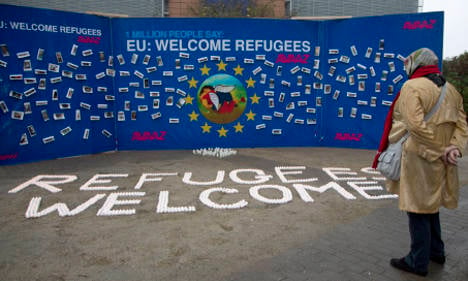Facing the biggest refugee crisis since the Second World War, ministers from EU member states started their talks at 3pm as part of ongoing efforts to try to heal deep divisions in the bloc over migrant policy.
The meeting comes after Germany – which is expecting 800,000 migrants this year – revealed it could no longer cope with the record influx.
Europe's top economy had previously signalled it would throw open the country's borders to Syrian refugees but ministers explained that regions could no longer cope with the rising number of arrivals.
Sweden, which takes in the second largest number of asylum seekers in the EU, has given no indication that it will follow Germany's lead.
As the refugee crisis has escalated, the Nordic nation has said it will continue to offer help to asylum seekers, while at the same time backing EU rules which suggest the first country of entry is required to deal with an asylum seeker's request for protection.
Last week Prime Minister Stefan Löfven said he strongly supported plans by the European Commission – the EU's executive – to redistribute 160,000 migrants across the continent to relieve pressure on “frontline” states such as Italy, Greece and Hungary.
However, this idea ran into stiff opposition from several Eastern European states such as the Czech Republic and Slovakia.
On Monday Löfven reiterated his thoughts at a joint press conference with European Parliament President Martin Schultz following separate talks between the two men in Stockholm.
“No country can handle this alone. We must come to a common solution,” Löfven said.
“Migration is not really a European problem, it is a global problem,” added Schultz.
READ ALSO: Record summer asylum applications in Sweden
Chancellor Angela Merkel's dramatic reinstatement of checks on Germany's frontiers has marked a new phase in the continent's migrant crisis and struck at the heart of the EU's cherished Schengen agreement, which allows border-free travel throughout most of the bloc.
The European Commission stressed that the German border decision “underlines the urgency to agree on the measures proposed by the European Commission in order to manage the refugee crisis.”
Germany's ally France also rushed to Berlin's defence.
Merkel “is not shutting the door, she is re-introducing checks to ensure that those who enter Germany have the status of refugees and that the countries up the chain have respected the rules of Schengen”, Interior Minister Bernard Cazeneuve told RTL radio.
The German Chancellor, whose country expects to receive at least 800,000 asylum seekers this year, bluntly warned last month that the passport-free Schengen zone of 26 countries was under threat if the EU failed to work together on coping with the inflow.
“If we don't arrive at a fair distribution then the issue of Schengen will arise – we don't want that,” she said.
Britain, which is not part of the zone, on Monday appointed a minister to deal specifically with the 20,000 Syrian refugees the country has agreed to resettle over the next five years from camps bordering the war-torn country.
The International Organization for Migration has said that more than 430,000 people have crossed the Mediterranean to Europe this year, with 2,748 dying en route or going missing.
Sweden is expected to recieve at least 74,000 asylum applications by the end of 2015.


 Please whitelist us to continue reading.
Please whitelist us to continue reading.